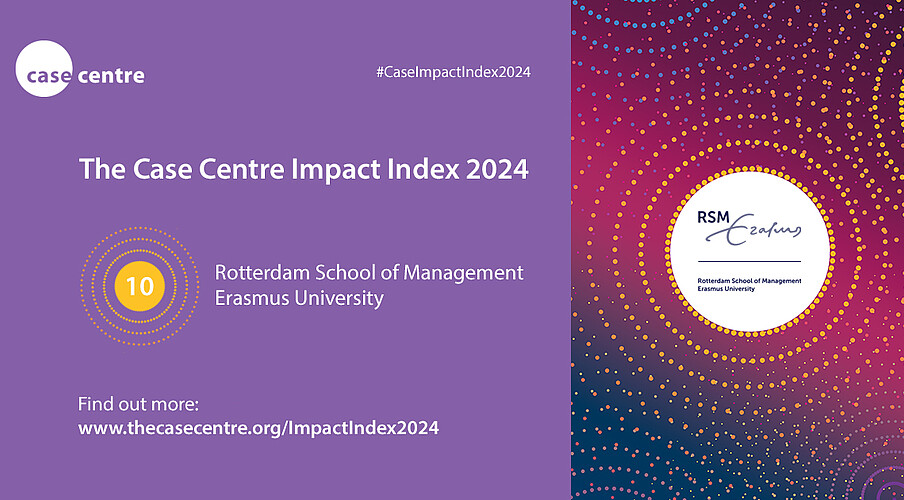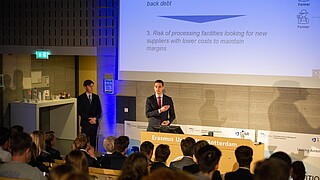Almost all of RSM’s cases developed by RSM’s Case Development Centre are directly or indirectly related to economic, environmental, or societal impact. RSM students receive holistic training, developing a range of skills essential for real-life problem-solving while studying a subject and gaining knowledge. Faculty and teaching staff also benefit, as CDC supports them in developing tailored teaching materials relevant to their fields and the European or Dutch contexts.
Core business fundamentals
CDC’s managing editor Tao Yue says: “RSM’s impact-driven cases have evolved from simply ‘creating awareness’ to ‘exploring core business fundamentals’. Impact is no longer an optional element added to our cases but a necessary component embedded within case content.” Yue adds that in developing cases together, CDC and RSM’s faculty recognise that impact considerations – or its absence – are present throughout business decision-making and operations. “We approach this as an integral part of our case-based education, rather than a stand-alone choice.”
Dr Bas Koene, director of the CDC, says that over the past year, the RSM Centre strengthened its collaboration with faculty to integrate the case method more deeply into RSM’s education. “We entered a new area of custom-designing case studies for assessments and have developed assessment cases for programmes such as technology management, innovation management, and human resources management.”
Real-world problems
Dr Koene adds that this approach has made large bachelor courses more interactive and engaging while also testing students’ multifaceted skills by having them solve real-world problems. “The method is highly scalable across additional programmes, and the developed cases can be updated or renewed for continued use in the future,” says Koene.
Yue agrees: “We have a clear vision for our educational goals, especially regarding teaching cases, and we work steadily toward it, adapting our case focus and content to reflect current business and societal debates. That’s how we secured a top 10 spot once again!”
Energy transition
RSM’s cases also reach a broader audience, including educators and students at other institutions, business leaders, practitioners, and public sector decision-makers—all of whom may find RSM’s publicly distributed cases informative and insightful.
The CDC is now developing a series of cases on energy transition. Recent high-impact cases include those on service leadership, entrepreneurial legacy, stakeholder engagement for horticulture, strategic marketing for circular fashion, design thinking for innovation, and a set co-developed with a consortium of universities exploring the intersection of technology and sustainability.
Impact-driven cases
The RSM CDC case collection comprises hundreds of cases and teaching notes on a wide range of topics and industries, including international bestsellers and award winners. CDC works closely with RSM faculty members to develop and write cases used in bachelor, master, MBA, and executive courses. Some of the cases also have multimedia supporting materials.
There’s an extensive list of RSM’s teaching cases available on The Case Centre’s website, some are free. The free case collections include QuinnE cases, ENABLE cases, SELIS cases and Sustainable Development Goals (SDG) cases.
“With so many new schools joining the Impact Index for 2023/24, building on the work of those with established influence, it’s fantastic to celebrate these tremendous contributions to the business education community,” says Vicky Lester, CEO of The Case Centre. She adds: “The Index is a wonderful opportunity to celebrate those schools demonstrating their commitment to high quality case writing. Writing that is educational, engaging, and influential to students and teachers globally.”
The Case Centre Impact Index
The Case Centre, headquartered at Cranfield University, UK and with an office at Babson College, USA, is the independent home of the case method, with more than 500 member organisations worldwide. For many years The Case Centre has celebrated excellent cases, authors and teachers through its recognition portfolio of the annual bestselling and classic cases, awards and competitions, and bestselling case authors initiatives.
The launch of the Impact Index in 2023 extends the portfolio by providing a platform to recognise the global reach and impact of an organisation’s case writing. The Case Centre uses data from the previous academic year to compile the Impact Index. To reflect the global reach and impact of an organisation's case writing, the index metrics include how many of their cases have been adopted, by how many organisations, in how many countries, and how many individual students have been taught with the cases. All organisations that have published at least one case with The Case Centre during the previous academic year are eligible. Last year, RSM was also in the top 10 of The Case Centre’s first impact index







